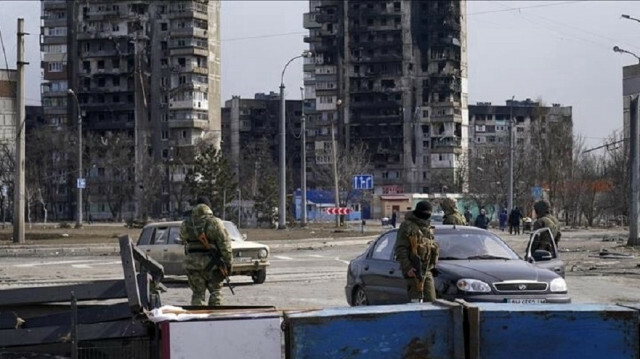
Since Feb. 24, war has so far killed thousands of people, displaced millions of refugees, devastated cities
It has been one month since Russian President Vladimir Putin launched what he called a "special military operation" against Ukraine, sparking the biggest war on a European state since World War II.
"One month already! That long," Ukrainian President Volodymyr Zelenskyy said on Telegram, calling for people to take a stand against the Russian invasion.
“The world must stop the war. I thank everyone who acts in support of Ukraine, in support of freedom, but the war continues. The acts of terror against peaceful people go on,” he wrote.
The month-old war has led 10 million people – nearly a quarter of Ukraine's population – to flee their homes, according to the UN, either internally displaced or seeking refuge in neighboring countries.
Children and civilians are bearing the burden of the war, which has so far led to the deaths of 128 children, according to Ukrainian officials.
At least 1,035 civilians have been killed so far in Ukraine and more than 1,600 injured, according to UN estimates, while officials caution the true toll is likely much higher, as there is limited access to warzones.
With Russian forces apparently frustrated by an unexpectedly fierce Ukrainian resistance, there is no seemingly end in sight to the conflict.
Defying threats of sanctions by the West, Moscow officially recognized the enclaves of Donetsk and Luhansk in Donbas, eastern Ukraine as independent states before launching the war on Feb. 24.
After Russian armed forces were unable to seize control of Ukraine with a lightning offensive in the first week of the war, they shifted strategy to the bombardment of cities with artillery, airstrikes, and missiles.
Russian forces have repeatedly struck the capital Kyiv but have failed to encircle it. The troops instead pressed towards the cities of Kharkiv and Kherson.
On March 2, Russian tanks entered Kherson, the first and only major city to fall to the Russians during the first month of the war.
The besieged southern port city of Mariupol – which would help Russia establish a land bridge to already occupied Crimea – has been the hardest hit. About 100,000 civilians remain trapped in the city without running water, electricity, or heating, and with supplies of food dwindling as Russian forces were accused of bombing an evacuation corridor, preventing humanitarian supplies from reaching Mariupol.
On March 18, Russia claimed it had used its hypersonic Kinzhal missiles for the first time to destroy an underground weapons depot in Ukraine.
- Diplomatic efforts
Russia and Ukraine kept the diplomatic path open by holding several rounds of negotiations.
The Russian and Ukrainian delegations have met three times in the Belarussian city of Brest. The first round of negotiations took place on Feb. 28 – just four days into the war – in Gomel, Belarus, near the Ukrainian border, and lasted five hours.
The second round took place on March 3, and the third on March 7.
On March 10, a high-level tripartite meeting between Turkiye, Russia, and Ukraine took place in the Turkish city of Antalya as part of Turkiye's efforts to mediate between the warring countries. As it has friendly ties with both countries, Turkish officials have said they are in a unique position to help broker peace.
Turkiye’s efforts for peace have won praise worldwide.
On March 24, an extraordinary meeting of NATO heads of state and government began in Brussels to discuss the alliance's response to Russia's war on Ukraine. On day one, the allies announced more aid to Ukraine as well as sending more forces to protect NATO’s eastern flank from any possible further attacks.
Moscow has set various conditions to end the war in Ukraine. For instance, it wants Ukraine to amend its Constitution to state unequivocally that Kyiv will not join any alliance and that Crimea – illegally annexed by Russia in 2014 – is Russian territory.
In February 2019, Ukraine's parliament approved amendments to the Constitution that enshrine Ukraine's desire to join NATO.
- Rattled global economy
The war has also rattled the global economy and the geopolitical order. Russia has been hammered with severe punitive sanctions, including asset freezes and export bans.
A surge in commodity prices reflects traders worrying that the conflict between Russia – a key supplier of oil, natural gas, coal, aluminum, and wheat – and Ukraine, also a key exporter of wheat and oilseeds, could lead to inflation, disrupt supply chains and derail the global economic recovery.
While the US has imposed a ban on Russian oil, the EU, heavily reliant on Russia for its energy needs, is still debating joining the embargo.
Russia’s participation in the world's economy is also further endangered by a review of its access to the World Trade Organization.

